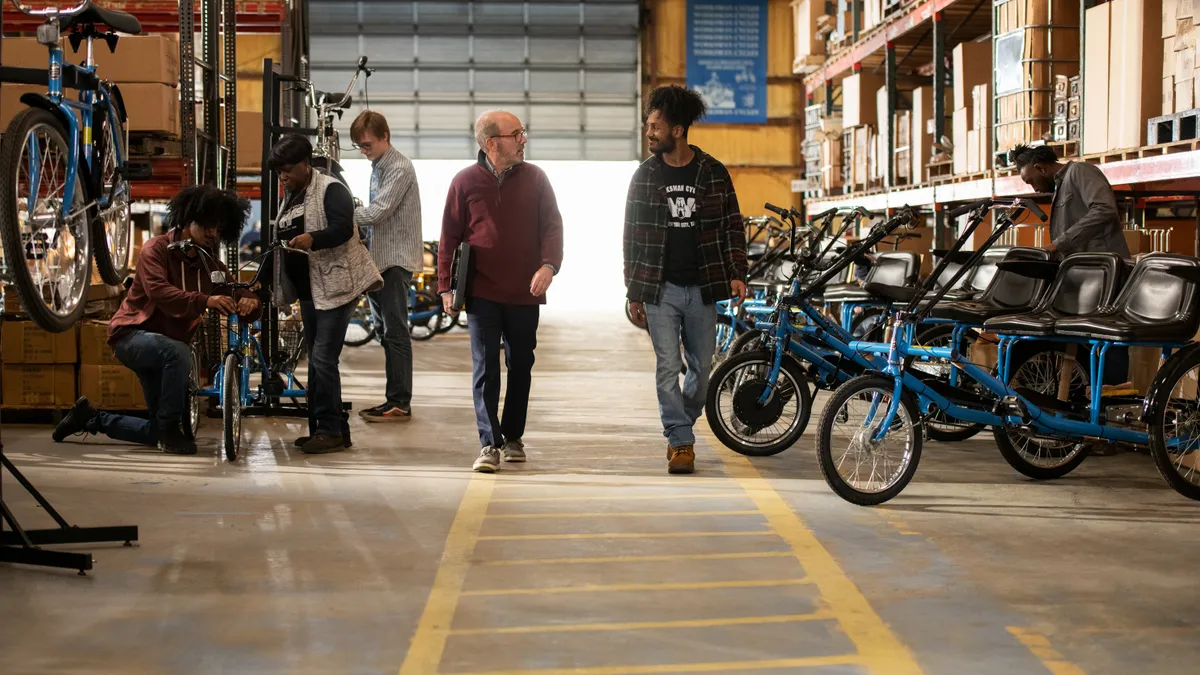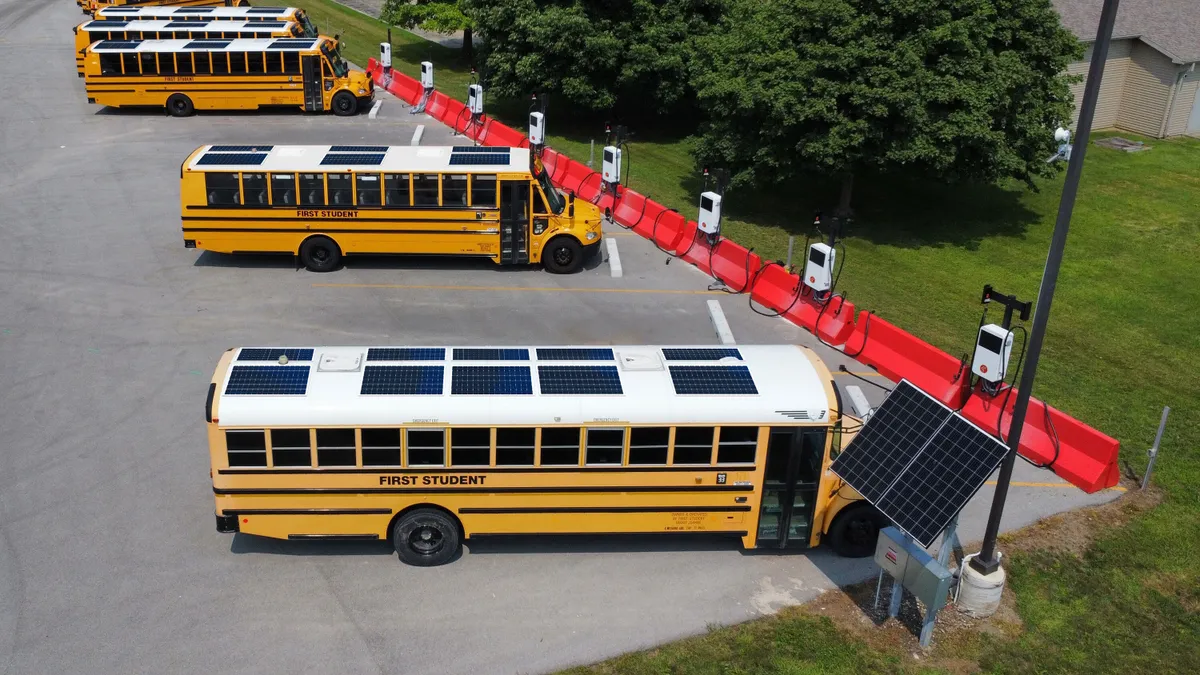More than a century ago in New York City, Morris Worksman founded a company to build bicycles on what would become the site of the World Trade Center in Manhattan.
The Worksman Cycles business was founded in the belief that a three-wheeled cycle could offer a more cost-effective and efficient way to move around the city than the horse and wagon. And in addition to providing delivery tricycles for the Good Humor Ice Cream Company, they also built heavy-duty bikes and trikes for factory workers and other products for people with disabilities.
Fast forward over 100 years and the company is now participating in what some have called a cycling renaissance, in part due to the pandemic, but also because more businesses are seeking ways to reduce delivery congestion amid a surge in online shopping activity.
Smart Cities Dive caught up with Worksman Cycles President Wayne Sosin for a discussion about the company's past, its present and what the future holds for its business and urban cycling.
This interview has been edited for brevity and clarity.
SMART CITIES DIVE: How have you kept your products evolving, while staying ahead of trends and identifying those niches that you've needed to fill?
WAYNE SOSIN: Some of it was a natural evolution, which is kind of interesting. When I first joined the company, the idea of having American factory workers riding a tricycle was not all that popular. But now the message is much more accepted, because aerobic fitness is much more in vogue. Workers seem to be in better physical condition, companies are looking for safety and looking to be green. So it's almost evolved where the marketplace has changed more than we have.
Courtesy of Chase Ink
But more importantly, we made decisions that made us different from our competition. The entire bicycle manufacturing industry in the United States went away in the 1990s. There were massive companies making millions of bicycles, and they either went out of business or went to China and closed their American factories. And as a result, there were really no legacy companies left in the United States. We drew a line in the sand, and we said we're not going overseas, we're staying here, we believe in the American worker. We believed our customers would appreciate the fact that their bikes were made right here in America and it gave us a lot of flexibility… The biggest challenge we faced was that when all these big companies went away, so did our source of supplies. We had to then internationally source more than we used to.
Was that a tough transition, importing parts when everything was domestic before?
SOSIN: It's a lot easier to pick up the phone, call somebody and say, "I need more." You have to create relationships. In the past we had been able to buy thousands of seats. Now, you have to buy 10,000 for transportation to make sense. So we had to make some difficult changes, but in the end, it's all working out fine.
You guys moved into electric bikes as well — how has that part of the business evolved?
SOSIN: On the electric end of things, we recognized early that electric tricycles made sense, especially because we were dealing with so many customers with disabilities. It's become a significant part of our business. In fact, it's beyond just using them for people with disabilities or people who want the convenience of an electric tricycle. We've now done it for delivery services and other applications where electric bicycles make sense.
We worked with Lime and provided their presentation to New York City for their application [for the dockless pilot program]. Three custom-made lime green tricycles have different formats that allowed them to satisfy the Americans with Disabilities Act, and to present to New York City that they were going to do more than just scooters, they were going to reach out to disabled populations.
I'm curious about the use of e-bikes for delivery. It sounds a little bit like you've come full circle and stayed very true to your early roots of delivering goods in 1898?
SOSIN: We've preached for years the beauty of pedaling to get where you’re going. It's an incredible vehicle. And for years, we were really going against the trend because Americans looked at bicycles as strictly a recreational item. The trend right now is to go towards the electric assistance, so we got ourselves involved in that. And sometimes it's overkill, because there's so many cases where a pedal driven bike will get the job done in such a simple way with less maintenance, lower cost and no battery to dispose of. So it's not like we’ve gone all in. We've always been involved with urban delivery cycles. And if given the opportunity when we talk to customers, we say before you go electric, let's talk about pedaling, you’re only going an eight-block radius in a flat city, you don't need electric. It depends on the customer and what they're doing. We want it to be adaptable to whatever they need.
"In the 1980s, if you rode a bicycle to your office, people looked at you like you were some sort of an oddball... And now it's in vogue, and actually if you're doing that, you're ahead of the curve."

Wayne Sosin
President, Worksman Cycles
No idea is really new in transportation. Given that, what do you feel we can we learn from the past, particularly when it comes to bicycling and deliveries?
SOSIN: There really isn’t anything that's new, it's just been refined. A lot of the patents from 1898 look like bicycles look today.… And I think sometimes things come full circle. There was a time where everybody got away from using bicycles and tricycles for delivery, and everybody was using vans, trucks and cars. Now, you can see that companies are looking at ways to be more efficient to save money to simplify their operations, so bicycles have become involved again for urban transportation and deliveries. In the 1980s, if you rode a bicycle to your office, people looked at you like you were some sort of an oddball. In New York, at the very least, people would say, "Look at that crazy guy wearing a suit and driving a bike." And now it's in vogue, and actually if you're doing that, you're ahead of the curve.
What do you think the founders of the company would say, if they saw 2021, with biking back in vogue in cities?
SOSIN: They were visionary. And I think they were way ahead of the curve. I don't know that they would have seen things exactly as they are now, but they saw tricycles and bicycles — mostly tricycles — as being practical vehicles. They saw them as doing a job just as a truck would, or a van. And guess what, it's 100 years after they thought about it. I think they would be very proud and just kind of sit back and say, "Hey, we got this one right."
What does the future hold for Worksman, and for bicycling in general?
SOSIN: As the world is such a crazy place, there are a lot of challenges right now in the bicycle industry. And the biggest challenge is the supply chain is all down. The supply chain has got so disrupted through the pandemic, but the future of the bike industry is strong and that there’s demand for bicycles. The pandemic brought out a really huge demand for bicycles that never existed before worldwide, especially e-bikes, so it created demand that the component suppliers just absolutely cannot meet… So there's a short term challenge for the entire bike industry. But long-term, if anything good came out of the pandemic, it's that outdoor activities have taken on a renewed interest. So whether you're riding a bicycle, or going in a kayak or swimming in a pool, these things have definitely created a huge demand and interest.




















